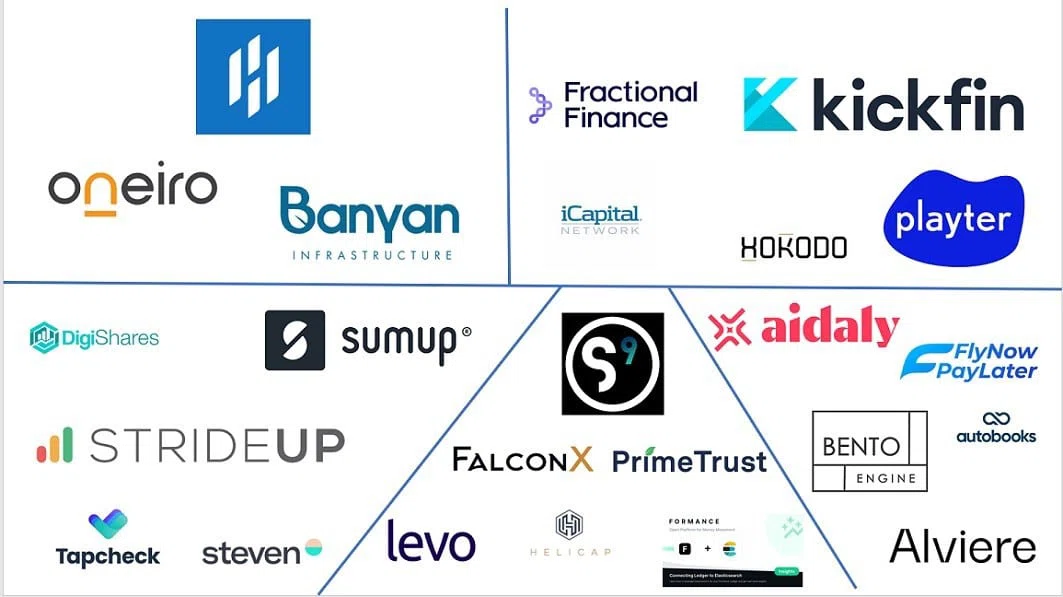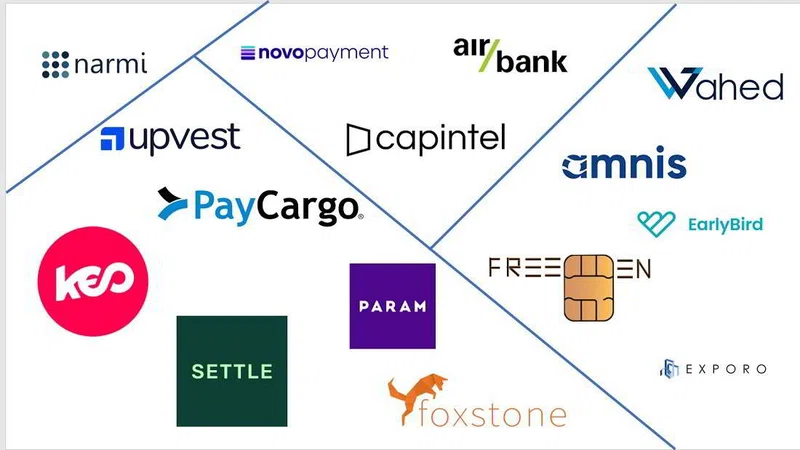Overview
Fintech investing never sleeps. In the past week, there was nearly US$1.5bl invested in 26 companies that I identified through Crunchbase that fit my particular definition of a fintech business. I extended my lens a bit this week to include businesses that sit in the space where financial technology, digital assets and cryptocurrency converge to underscore the fact that while the debate around valuation may continue, underlying funding into core infrastructure continues unabated.
I have taken the opportunity to further refine my segmentation framework so that readers can get a glimpse on which type of target operating models are being funded, as well as whether the proposition is more geared toward a software (SAAS) delivery model, or an actual financial service. One will note that when it is the later, debt funding is increasingly prominent as a mechanism to increase scale and meet demand. I have also tried to better identify innovation at work, as particular segments seek to utilize both blockchain DLT architecture, as well as tokenization to broaden access.
Thematically, a number of new fintech are continuing to emerge that want to help people who sit in the lower income bracket of society. Many individuals in this bracket will be hit hardest by rising costs for essential services and thus will need the most help with managing their financing. While BNPL will hopefully not itself prove in the near future a destructive as opposed to beneficial cash flow tool, other mechanisms in the workplace and in specific areas, like family care, are emerging seeking to bring together education, advice, and more immediate access to earnings (in different forms) when needed. The advancement of these types of initiatives is likely to be crucial, if as seems likely, we are in for a sustained period of inflation for basic and essential goods and services.
Segment 1: Fintech B2B/SME Software and Financial Services
Companies: Playter, Hokodo, Autobooks, Alviere

Total invested = US$145ml (approx.) Debt & Equity from VCs, Banks, Corporates and Angels
Commentary: SME companies are often the ones that suffer most from supply chain disruption and the accompanied increases in cost. The disruptions to cash flow can be severe, both preventing distribution as well as production. Fintechs that are launching solutions to help tend to fall into two different camps. One group is focused on helping SME offer a more flexible financial experience to customers. This is accomplished by SME utilizing embedded finance, both through offerings like BNPL as well as through adopting e-money driven products and services. Recently funded examples in this category include the US$40ml series B funding for Hokodo and the US$50ml Series C funding for Autobooks. The other group, as opposed to providing a service platform that merchants and financial institutions deploy positions itself as a direct lender, providing cash flow management solutions. One finds an increasing variety of BNPL players in this market, many of whom, like Playter, who received US$55ml, will target a particular client segment. E-money providers who want to further build partnership programs like Alviere also will fall into this category.
Segment 2: Investing & Wealth Management Software & Services
Companies: Bento Engine, Helicap, Icapital Network, Levo Financial

Total invested = US$7ml (approx.) Equity from VCs, Family offices, Banks, Corporates and Angels
Commentary: There hasn’t been a lot of substantial funding in the wealth management arena in the past week, although financial institutions, family offices, and venture firms still remain supportive of funding alternative asset class marketplaces. Icapital is of course very well established in its propositional design, but other types of private capital marketplaces are continuing to target HNW wealth in Asia/Pacific. The Helicap platform is a good example of this. Another theme that got some attention this week was in the hybrid advice arena. While this is an thematic topic that has gotten a lot of attention in the UK, it is just as big a problem in the States. Facet Wealth has been created as a new type of ria to tackle the problem directly, but SAAS software applications, such as Bento Engine, which completed a seed round last week are also getting backing from Angel networks. These types of initiatives are new and have to face the reality that many seasoned RIA practices do not see the immediate attraction of taking on more clients with less assets when the regulatory climate is becoming more challenging.
Segment 3: B2C Lending and Payment Software and Services
Companies: Fly now pay later, Steven, Aidaly, Tapcheck inc

Total invested = US$44ml (approx.) Equity from VCs, Angels, Bank, Family office and Corporate
Commentary: It would be natural for venture capital funding to b2c business models to start to dry up. However, certain types of benefit programs for consumers, such as salary advance initiatives, bill splitting and expense management solutions for p2p loans, and support services for care givers were all receivers of new early-stage funding last week from a combination of venture capital firms and angel networks. The larger funding amounts not surprisingly were achieved by companies that are operating as financial service providers or intermediaries.
Segment 4: Cryptocurrency Services for Institutions
Companies: Prime Trust, System9, FalconX
Total invested = US$307ml (approx.) Equity from VCs, Corporates, and Asset Management (HF)
Commentary: When Terra failed there were quickly other implications that could have spiraled into some type of Death spiral for certain areas of decentralized finance. (i.e. those using UST as collateral) This appears to be avoided, but the events of the past month are further focusing the mind on backing ventures that will serve institutional investor requirements for buying and holding crypto assets. This is leading to investors looking to not only back more mature organizations underwriting much larger amounts to ensure that they can weather any potential systematic risk events. This was underscored by the US$100ml series B financing for Prime Trust, and the even larger US$150ml series D financing for FalconX.
Segment 5: Payment Services for SMEs
Companies: Kickfin, Sumup, Formance
Total invested = US$632ml (approx.) Equity from VCs, Sovereign Wealth, Corporate, Asset Management and Banks
Commentary: Payments has been one of the most funded areas in the Fintech ecosystem that accelerated even further during the pandemic. The pace of funding has now slowed, but nevertheless established behemoth’s in the SME payment arena like Sumup can still raise substantial amounts of capital even if the valuation of their E590ml financing was roughly 40pct of a rumored target in January. Venture firms continue to take an interest in the speed of payment completion more so than the range of payment processing that was popular in 2019–2020.
Segment 6: Real Estate Investing and Home Ownership Platforms
Companies: Fractional Finance, Digishares, Strideup, Homechain

Total invested US$347ml (approx.) in Debt & Equity from Angles, Corporates, and VCs
Commentary: While there is talk of a slowdown about to hit the real estate market, the huge price increases that have been witnessed have definitely resulted in reduced affordability and access to certain demographics. This week’s funding in the real estate segment represents a number of different ways affordability gaps could be addressed. One answer as demonstrated by the huge debt funding acquired by Strideup is via the partial home ownership model. In this approach borrowers become shared owners and thus have an opportunity to get on the property ladder with both a reduced deposit and less challenges to affordability. The natural extension of shared ownership is real estate fractionalization and thus one sees the emergence of blockchain ideas also emerging. At this point, ventures like Digishares, and Frabric are mostly appealing to either angel investors or real estate insiders rather than venture firms.
Section 7: B2B Capital Market Software
Companies: Banyan Infrastructure, Oneiro Solutions
Total invested US$45ml (approx.) in Equity from Asset management, Corporates, VCs, and Angels
Commentary: I don’t often see a lot of capital market software initiatives any more but the Series A deal for Banyan Infrastructure and the seed financing by angels for oneiro both caught my attention. These deals underscore the fact that SAAS solutions for much more complex case management type situations that involve managing a lot of different counterparties, and document management are increasingly due to low/code — no/code solution designs becoming possible. These types of platforms become possible when secure environment to accommodate different levels of counterparty permissions becomes possible and when complex workflow design options can be constructed and maintained for all users.










